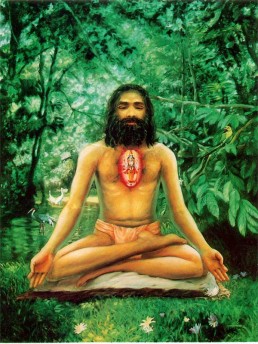Swami Chinmayananda
Swami Chinmayananda Commentary
The hereafter is ordered by the actions performed and the motives entertained here. Actions in life can be mainly classified as good and evil; and the pursuers of the evil can only slip down the path of evolution. Those who are doing good work alone can start their climb on to the higher points on the tower of their spiritual progress. Even here, our text-books make a careful distinction and classify all good activities under two main headings: (a) actions performed with desires, and (b) those that are performed in a spirit of dedicated love and in a sense of divine worship. Since reactions to actions depend entirely upon the motives that propel those actions, the results accruing from selfish and selfless activities must necessarily differ from one another. Naturally, there must be different routes of progress to the same Pinnacle of Perfection. All of them are being indicated here in this section.
Those who are employing themselves in the worship of the Lord with desire for heavenly enjoyments will, after their death, reach those planes-of-consciousness which are conducive for exhausting all such desires and, having exhausted these desires therein, they will take their birth again, here in the world, “IN THE HOUSES OF THE PURE AND THE PROSPEROUS.” In short, all burning desires of every human will be fulfilled at one time or another, if the desires are strong enough and are accompanied by intense activities appropriate for their fulfilment.
BUT WHAT HAPPENS TO THOSE WHO ARE PURSUING THE GOOD, IN A SPIRIT OF SELF-LESS DEDICATION?
Adi Sankara Commentary
Prapya, attaining, reaching, lokan, the worlds; punya-krtam, of the righteous, of the performers of the Horse-sacrifice, etc.; and usitva, residing there, enjoying the stay; for sasvatih, eternal; samah, years; (then,) when the period of enjoyment is over, the yoga-bhrastah, man fallen from Yoga, the one who had set out on the path Yoga, i.e. a monk-as understood from the force of the context [From Arjuna’s question it minght appear that he was asking about the fate of people who fall from both the paths, viz that of Karma and of Meditation. But the possibility of getting ruined by performing actios (rites and duties) according to Vedic instructions does not arise, since their results are inevitable. However, the question of ruin is relevant in the case of a monk, for on the one hand he has renounced actions, and on the other he may fail to attain perfection in Yoga in the present life. Hence, the Lord’s answer relates to the fall and ruin of a monk alone.]; abhijayate, is born; gehe, in the house; sucinam, of the pious, who perform actions according to scriptural instructions; and srimatam, who are prosperous.
The Bhagavad Gita with the commentary of Sri Sankaracharya – Translated by Alladi Mahadeva Sastry
Holy Geeta – Commentary by Swami Chinmayananda
The Bhagavad Gita by Eknath Easwaran – Best selling translation of the Bhagavad Gita
The Bhagavad Gita – Translation and Commentary by Swami Sivananda
Bhagavad Gita – Translation and Commentary by Bhaktivedanta Swami Prabupadha
Srimad Bhagavad Gita Chapter 6 – Verse 41 – 6.41 prapya punyakrtam – All Bhagavad Gita (Geeta) Verses in Sanskrit, English, Transliteration, Word Meaning, Translation, Audio, Shankara Bhashya, Adi Sankaracharya Commentary and Links to Videos by Swami Chinmayananda and others – 6-41

